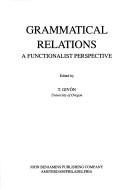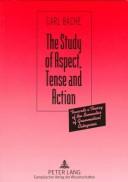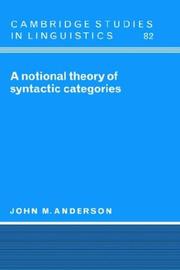| Listing 1 - 4 of 4 |
Sort by
|
Book
ISBN: 3484303662 3110959976 Year: 1997 Volume: 366 Publisher: Tübingen Max Niemeyer Verlag
Abstract | Keywords | Export | Availability | Bookmark
 Loading...
Loading...Choose an application
- Reference Manager
- EndNote
- RefWorks (Direct export to RefWorks)
Dieser Sammelband enthält eine Auswahl der Beiträge, die 1994 auf einem Workshop zur Distinktion lexikalischer Kategorien gehalten wurden. Die verschiedenen theoretischen Richtungen zuzuordnenden Arbeiten befassen sich mit allgemeinen Problemen der Kategorisierung sowie mit Fragen, die sich speziell für bestimmte lexikalische Kategorien (Nomina, Verben, Präpositionen, Konjunktionen) insbesondere in Abgrenzung zu funktionalen Kategorien ergeben. The volume contains a selection of papers given at a workshop organized in 1994 on major lexical categories. The seven articles in this volume take a variety of viewpoints concerning problems of distinguishing major categories in general, as well as problems in connection with specific categories, namely nouns, verbs, prepositions, and conjunctions.
Lexicology. Semantics --- Grammar, Comparative and general --- Semantics --- Formal semantics --- Semasiology --- Semiology (Semantics) --- Comparative linguistics --- Information theory --- Language and languages --- Lexicology --- Meaning (Psychology) --- Categories, Grammatical --- Grammatical categories --- Categorization (Linguistics) --- Componential analysis (Linguistics) --- Major form classes --- Grammar [Comparative and general ] --- Congresses --- German language --- English language --- Philology & Linguistics --- Languages & Literatures --- Semantics. --- Linguistics --- Philology --- Grammatical categories.

ISBN: 1283315785 9786613315786 9027275785 9789027275783 1556196466 9027229317 9789027229311 1556196458 9781556196454 9781556196461 9027229325 9789027229328 Year: 1997 Volume: 35 Publisher: Amsterdam ; Philadelphia John Benjamins publishing company
Abstract | Keywords | Export | Availability | Bookmark
 Loading...
Loading...Choose an application
- Reference Manager
- EndNote
- RefWorks (Direct export to RefWorks)
This volume presents a functional perspective on grammatical relations (GRs) without neglecting their structural correlates. Ever since the 1970's, the discussion of RGs by functionally-oriented linguists has focused primarily on their functional aspects, such as reference, cognitive accessibility and discourse topicality. With some exceptions, functionalists have thus ceded the discussion of the structural correlates of GRs to various formal schools. Ever since Edward Keenan's pioneering work on subject properties (1975, 1976), it has been apparent that subjecthood and objecthood can only
Grammar, Comparative and general --- Functionalism (Linguistics) --- Functional analysis (Linguistics) --- Functional grammar --- Functional linguistics --- Functional-structural analysis (Linguistics) --- Grammar, Functional --- Grammatical functions --- Linguistics --- Structural linguistics --- Grammaticalization --- Semantics --- Categories, Grammatical --- Grammatical categories --- Categorization (Linguistics) --- Componential analysis (Linguistics) --- Grammatical categories. --- Grammaticalization. --- Syntax --- Major form classes --- Catégories grammaticales --- Grammaticalisation --- Fonctionnalisme (Linguistique) --- Grammar --- Grammar [Comparative and general ] --- Philology

ISBN: 3631322453 0820435090 9783631322451 Year: 1997 Publisher: Frankfurt a.M.: Lang,
Abstract | Keywords | Export | Availability | Bookmark
 Loading...
Loading...Choose an application
- Reference Manager
- EndNote
- RefWorks (Direct export to RefWorks)
Lexicology. Semantics --- Linguistics --- Grammar --- Grammar, Comparative and general --- Semantics. --- Metalanguage. --- Catégories grammaticales --- Verbe (Linguistique) --- Sémantique --- Métalangage --- Grammatical categories. --- Verb. --- 801.56 --- Syntaxis. Semantiek --- 801.56 Syntaxis. Semantiek --- Catégories grammaticales --- Sémantique --- Métalangage --- Semantics --- Formal semantics --- Semasiology --- Semiology (Semantics) --- Comparative linguistics --- Information theory --- Language and languages --- Lexicology --- Meaning (Psychology) --- Verb --- Categories, Grammatical --- Grammatical categories --- Categorization (Linguistics) --- Componential analysis (Linguistics) --- Verb phrase --- Verbals --- Reflexives --- Major form classes --- Philology --- Grammar, Comparative and general - Verb. --- Grammar, Comparative and general - Grammatical categories.

ISBN: 0521580234 9780521034210 9780521580236 9780511519734 0521034213 0511519737 0511835868 Year: 1997 Volume: 82 Publisher: Cambridge: Cambridge university press,
Abstract | Keywords | Export | Availability | Bookmark
 Loading...
Loading...Choose an application
- Reference Manager
- EndNote
- RefWorks (Direct export to RefWorks)
This book presents an innovative theory of syntactic categories and the lexical classes they define. It revives the traditional idea that these are to be distinguished notionally (semantically). It allows for there to be peripheral members of a lexical class which may not obviously conform to the general definition. The author proposes a notation based on semantic features which accounts for the syntactic behaviour of classes. The book also presents a case for considering this classification - again in rather traditional vein - to be basic to determining the syntactic structure of sentences. Syntactic structure is thus erected in a very restricted fashion, without recourse to movement or empty elements.
Grammar, Comparative and general --- Semantics --- 801.56 --- Formal semantics --- Semasiology --- Semiology (Semantics) --- Comparative linguistics --- Information theory --- Language and languages --- Lexicology --- Meaning (Psychology) --- 801.56 Syntaxis. Semantiek --- Syntaxis. Semantiek --- Syntax --- Categories, Grammatical --- Grammatical categories --- Categorization (Linguistics) --- Componential analysis (Linguistics) --- Major form classes --- Lexicology. Semantics --- Grammar --- Grammatical categories. --- Syntax. --- Semantics. --- Grammaire comparée --- Sémantique --- Catégories grammaticales --- Syntaxe --- Syntaxe. --- Arts and Humanities --- Language & Linguistics --- Linguistics --- Philology --- Grammar, Comparative and general - Grammatical categories --- Grammar, Comparative and general - Syntax --- Grammar, Comparative and general Syntax
| Listing 1 - 4 of 4 |
Sort by
|

 Search
Search Feedback
Feedback About UniCat
About UniCat  Help
Help News
News